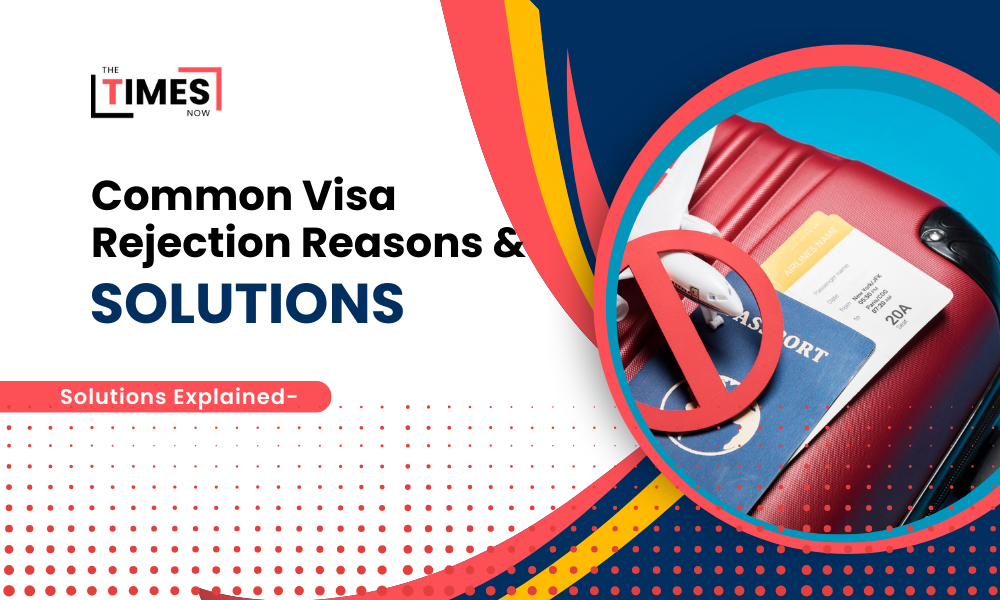15 Common Visa Rejection Reasons and Solutions Explained
Immigration protocols are crucial for ensuring a country’s safety. Failing to adhere to visa rules can lead to rejection, which not only dampens your excitement but also jeopardizes future visa approval prospects. Let’s delve into the common reasons for visa rejections and how to steer clear of them to secure your visa approval.
Understanding Visa Refusal and Rejection
Visa refusal occurs when your appeal to enter another country is rejected by the embassy consulate or high commission. They provide relevant reasons for the rejection, aiding in rectifying mistakes for future applications. Apart from missing documents or information, several other factors contribute to visa refusal.
Common Visa Rejection Reasons and Refusal
While there are numerous reasons for visa refusal, here are the 15 most prominent ones:
- Incomplete Application and Data Mismatch: Ensure every section of the visa application form is filled accurately, leaving no blanks. Any data mismatch or incomplete information can lead to rejection.
- Violating Visa Rules and Documentation Process: Adhere strictly to immigration rules and document guidelines to avoid rejection due to discrepancies.
- Incomplete Travel Itinerary: Provide a comprehensive travel plan including dates, flight details, and hotel bookings.
- Inapplicable Travel Insurance: Ensure your travel insurance meets the requirements of the destination country, especially for Schengen countries.
- Insufficient Reason Explaining the Intent of Travel: Provide adequate proof supporting your reason for visiting the country, whether for business, study, or tourism.
- Status of Your Passport: Ensure your passport is valid and meets the requirements of the destination country.
- Time of Visa Application: Apply for a visa well in advance to avoid rejection due to processing delays.
- Shortage of Funds: Maintain sufficient funds in your bank account to cover the expenses of your stay in the destination country.
- Criminal Records: A criminal record can lead to visa rejection unless it has been cleared.
- Sponsor’s Credibility: If sponsored, ensure the sponsor meets the necessary criteria set by the embassy.
- Unfavorable Travel History: Poor travel history, including previous visa cancellations or overstays, can lead to rejection.
- Visa Interview Process: Be genuine and confident during the visa interview to avoid cancellation based on suspicion.
- Health Status: Ensure you meet the health requirements of the destination country.
- Intent of Return: Provide evidence of ties to your home country and a clear intention to return.
- Political Relations: Political tensions between your country and the destination country can lead to rejection.
Steps to Avoid Visa Refusal and Rejection
To avoid visa rejection, follow these steps diligently:
- Read embassy guidelines thoroughly.
- Fill out the application accurately and attach valid documents.
- Maintain sufficient funds and provide a clear intent of travel.
- Apply well in advance and complete all formalities correctly.
Checking Visa Rejection Status
You can check the status of your visa application on the consulate’s website using the relevant details provided during the application process.
Knowing Visa Rejection Reasons
- Upon rejection, you will receive a letter stating the reason for refusal. Some consulate websites also provide rejection reasons online.
- Remember, providing false documents or invalid credentials can permanently affect your visa eligibility.
- In conclusion, understanding and addressing visa rejection reasons are pivotal for ensuring a smooth visa approval process. By meticulously adhering to embassy guidelines, providing accurate information, and maintaining transparency throughout the application process, you can significantly mitigate the risk of visa refusal.
- Remember, proactive measures such as thorough documentation, financial preparedness, and genuine intent to travel play a crucial role in enhancing your chances of obtaining a visa successfully. Stay informed, stay prepared, and navigate the visa application journey with confidence to achieve your travel aspirations.


